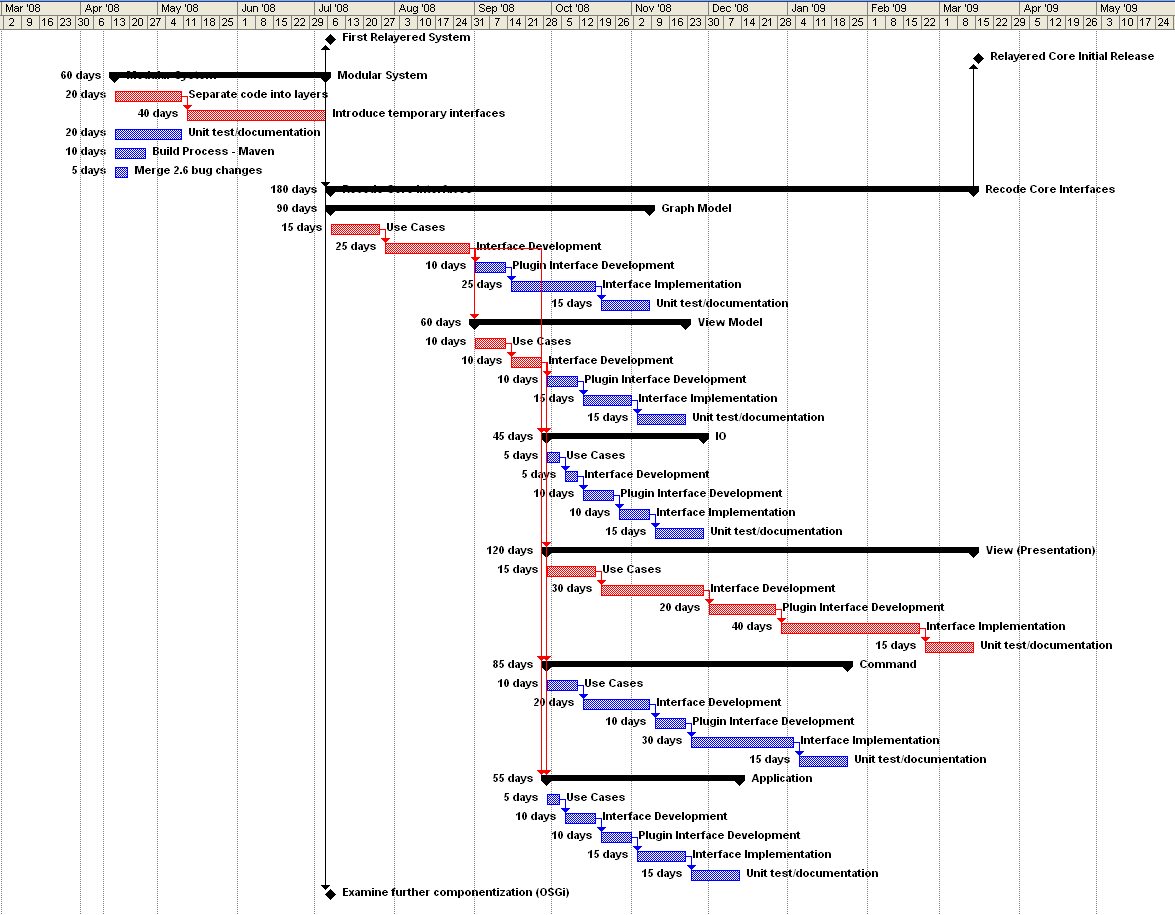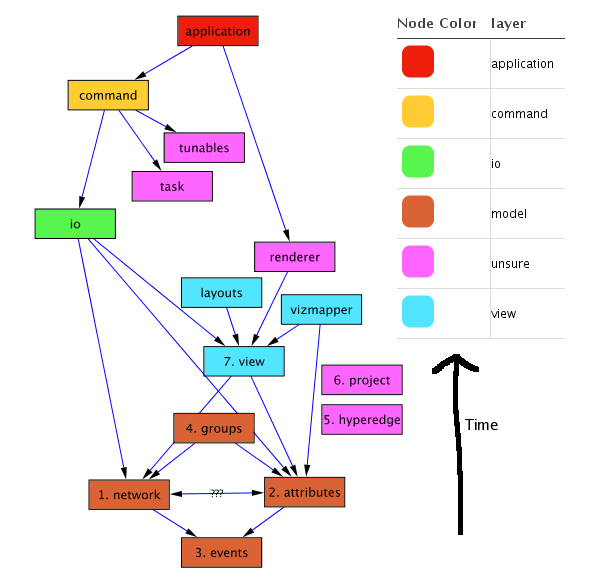Contents
This is a Legacy Document!
All information contained in this document is for historical purposes and does NOT contain current information! Visit http://wiki.cytoscape.org/Cytoscape_3 for up-to-date information.
What's New
- Developer's documents update in progress - Kei (3/10/2009)
Current progress on Cytoscape 3.0 development is monitored at /DevelopmentModules
Quick Start
3.0 API -- Please note that this still an active work-in-progress and subject to change at any time!
Plugin Development
This is a first version of documentation for Cytoscape 3.0 geared towards plugin developers Pages under this header will be put in a proper directory structure. In the near future all documentation regarding Cytoscape 3.0 will come in a clean separate wiki.
Release 3.0 Overall Goals
There are several motivations for release 3.0 of Cytoscape, but the overriding theme of the release is to refactor/redesign the code so that things become easier. Things in this case has several specific meanings:
Easier interface for plugin writers to understand and use.
Better modularity or layering making it easier for components of Cytoscape can be used in different contexts.
Clean up/refactor the structure of the existing Cytoscape core so that it can be more easily maintained, modified, and extended in the future.
Make backwards compatibility easier to maintain.
Clean up the user interface so that it's easier for users.
Desired Features
2.6. The primary feature for Cytoscape 3.0 is to do everything that 2.6 does. See Cytoscape.
Layer Cytoscape. Separate Cytoscape functionality into clearly defined layers or modules. The motivation is to allow alternative users of Cytoscape. For more information read: RFC 46, RFC 6, RFC 55.
Separate the view from the model. The motivation for this is to use Cytoscape in various headless (or alternatively headed) modes. See: RFC 6, RFC 55.
Command layer. In current versions of cytoscape one of the primary impediments to headless mode operation is the problem that the GUI it tightly coupled with almost all actions available to users (load file, save file, etc.). To solve this, Cytoscape needs a command layer that is cleanly separated from the application (not necessarily the view). This command layer should also be extensible so that plugin writers can add their own commands. See: Command Layer Discussions.
Improved Event handling. Cytoscape currently uses a mish-mash of different events to signal system state changes. This is confusing, error prone, and causes performance problems. We need to develop a simple, clean Cytoscape event handling interface that can be used listen for and fire common events. See: RFC 52.
Custom graphics. We would like the ability for plugin writers to be able to define their own shapes and edges to be displayed and integrated into Cytoscape. See: RFC 32, and (write shape RFC).
Improve build process and package structure. We would like to simplify the build process for cytoscape so that all necessary libraries and plugins can easily be found and built with the core. See: RFC 44.
Local Attributes. Allow for attributes to be specific to networks in addition to maintaining the current global attributes. See: RFC 31, RFC 37.
Dynamic language support. Implement a built-in support to access Cytoscape API from dynamic (scripting) languages. See: Scripting RFC
Refactoring Strategy
Rather than rewriting Cytoscape from scratch we intend to refactor the existing code base. Since we already have a working version of Cytoscape that suits many people's needs quite well, a central tenet of the refactoring process will be to maintain a working version of Cytoscape. That means that each time a change is made (i.e. code checked into the trunk), all unit tests should pass and Cytoscape's main functionality should still work. This will be an iterative process with many small changes, rather than a few large ones. The hope is that with this process we will not lose functionality as we make changes.
Rough module refactoring plan
The general plan is to begin by cleaning up the existing code base and modularize what we can while changing as little as possible. The goal is to establish the modules that comprise Cytoscape and the dependencies between them. Once we have a coherent structure of existing code, we can begin redesigning modules to suit our new requirements.
Prepare the existing code base for refactoring.
- Fix all deprecation warnings and remove unused code.
- Begin building software using maven instead of ant.
Separate existing code into modules.
- Networks
- Attributes
- View
- Layouts
- IO
- Plugins
- Write unit tests.
Once the existing code base has been cleaned up, we can begin our redesign efforts for 3.0. The general strategy will be to work from the bottom up. That is to say, begin with the modules at the base of the dependency graph that all other modules depend on. This means work on Networks and Attributes first, followed by the View and on up through the dependency graph.
A time schedule has been put together to allow for time to discuss and plan each module and provide some end dates for when each discussion should be finished and implementation can begin. As much as possible we will work to adhere to this to allow 3.0 to be released in a reasonable time frame. Start dates will be added after 2.6 is officially released.
Layer design discussion schedule
Layer |
Discussion organizer |
Description |
Status |
Discussion page |
Start Date |
Mike Smoot |
The core graph model for Cytoscape |
Will resume mid-late April |
May 8, 2008 |
||
TBD |
The view model representation (not the presentation layer). |
TBD |
TBD |
||
TBD |
IO layer (files, web services, databases, etc) |
TBD |
TBD |
||
TBD |
Presentation layer that renders the underlying view models |
TBD |
TBD |
||
TBD |
Formerly called Actions. UI-independent collection of high-level functions, such as creating network, execute layout, etc. |
TBD |
Command discussions/use cases, Tunable discussions/use cases, Monitor discussion/use cases |
TBD |
|
TBD |
|
TBD |
|
TBD |
API naming
The following table summarizes the classes that represent a given object in each layer.
Object |
Model |
Presentation |
|
network |
CyNetwork (and CyRootNetwork, CySubNetwork) |
||
node |
CyNode (and CyMetaNode) |
||
edge |
|||
attribute table |
* |
* |
|
row in attribute table |
* |
* |
|
column in attribute table (an attribute) |
* |
* |
* After discussing things at the second mini-retreat, we realized that visualizing CyDataTable/CyRow/CyColumns should have the same view-model and presentation layers that networks/nodes/edges have. We haven't discussed these, nor has anyone proposed names for them, which is why those fields are filled in.
Project Plan
See attachment for a nicely formatted version of the table below that includes time estimates, potential dates and notes regarding each. Please keep in mind this is meant to be very high level and will gain details through our discussions of each module. Cyto3ProjectPlan.xls
Note also that the dependencies and time estimates can change. Some of these things are potentially doable in parallel so we will update this as we determine which pieces are being done. As people volunteer for parts we will also add them to the table to keep everyone aware of what is being done.

ID |
Name |
Description |
Status |
Lead |
4 |
Modular System |
Milestone 1 - Layer current code base |
|
|
5 |
Separate code into layers |
Per the RFC's modules for Graph model, View model, IO, View (presentation), Application, Command |
|
|
6 |
Introduce temporary interfaces |
Starting with the graph model, write interfaces to allow other layers toaccess the graph model and remove all dependencies to classes outside the graph model. Once it has no dependencies, work on other layers to ensure dependencies are correct and unidirectional. |
|
|
7 |
Unit test/documentation |
Per each layer, multiple people can work on this |
|
|
8 |
Build Process - Maven |
Mavenize separate layers to build modularly again start from the graph model |
|
|
9 |
Merge 2.6 bug changes |
Merge 2.6 changes into 3.0 branch |
|
|
10 |
Recode Core Interfaces |
Milestone 2 - Replace temporary interfaces with stable, planned interfaces. First relayered system finished |
|
|
11 |
Graph Model |
Use what's been learned from Step 1 to write use cases specific to the graph model as used within core code. Ideally 3-10 use cases should be identified |
|
|
12 |
Based on use cases develop a graph model interface for core usage. Add indexing pattern forfast graph iteration. |
|
|
|
13 |
Interface Development |
|
|
|
14 |
Plugin Interface Development |
Determine if a separate Plugin interface is required to limit access to specific parts of the graph model. |
|
|
15 |
Interface Implementation |
|
|
|
16 |
Unit test/documentation |
Each layer's interface needs to include unit tests and documentation in order to be considered finished |
|
|
17 |
View Model |
Similar to Step 8, the difference being that this layer deals only in the persistable visual data that needs to be stored (but not the actual presentation layer) |
|
|
18 |
Use Cases/Discussions |
3-10 use cases |
|
|
19 |
Interface Development |
Provide for view models that are persistable but not dependent on the actual presentation. |
|
|
20 |
Interface Implementation |
|
|
|
21 |
Unit test/documentation |
|
|
|
22 |
IO |
|
|
|
23 |
Use Cases/Discussions |
|
|
|
24 |
Interface Development |
|
|
|
25 |
Plugin Interface Development |
|
|
|
26 |
Interface Implementation |
|
|
|
27 |
Unit test/documentation |
|
|
|
28 |
View (Presentation) |
|
|
|
29 |
Use Cases/Discussions |
|
|
|
30 |
Interface Development |
??? Not sure about this one. The presentation layer may require more time and will be adjusted later |
|
|
31 |
Plugin Interface Development |
|
|
|
32 |
Interface Implementation |
|
|
|
33 |
Unit test/documentation |
|
|
|
34 |
Command |
|
|
|
35 |
Use Cases/Discussions |
|
|
|
36 |
Interface Development |
|
|
|
37 |
Plugin Interface Development |
|
|
|
38 |
Interface Implementation |
|
|
|
39 |
Unit test/documentation |
|
|
|
40 |
Application |
|
|
|
41 |
Use Cases/Discussions |
|
|
|
42 |
Interface Development |
|
|
|
43 |
Plugin Interface Development |
|
|
|
44 |
Interface Implementation |
|
|
|
45 |
Unit test/documentation |
|
|
|
46 |
Examine further componentization (OSGi) |
|
|
|
Visual Development Timeline
This diagram displays provides lots of information:
- It provides a best (initial) guess of which modules will exist in Cytoscape 3.0.
- It shows some of the dependency relationships between modules.
- It groups modules into layers (based on color).
- Some modules (pink) haven't been put into layers because there is some question about which layer they should go in, but they have been put near the modules where they might belong.
- We will begin discussions at the bottom and work our way up (as indicated by the time arrow). There are tentative numbers assigned to the modules which we will discuss first.

Design Discussions
Using Maven with Cytoscape This includes links to plugins for Eclipse, IDEA and NetBeans as well as descriptions for use with Eclipse.
Mini-Retreat Discussions
Timeline
Release Date: TBD
Implementation
TODO List